@puntualizzazione.
>>Hermeneutik des Bruchs
Roberto de Mattei ist und bleibt eben ein knallharter Vertreter der [...] - "Hermeneutik des Bruchs".<< Im Kommentarbereich hier.
Unabhängig von meinen eigenen Leseeindrücken, die ich hier schon in sehr amüsanter Form von Kommentatoren begleitet vorfand ("Mehr Demut!" oder auch "Obacht!") obwohl ich noch keinen einzigen meiner Eindrücke veröffentlicht hatte (außer, wenn ich mich recht entsinne, dass ich das Buch spannend und kurzweilig fand oder so etwas), lasse ich an dieser Stelle Roberto de Mattei selbst zu Wort kommen.
>>The Councils can promulgate dogmas, truths, decrees, canons, which are issued from the Council, but they are not the Council. While dogma formulates a truth, the Councils are born and die in history. The Council is different from its decisions. The decisions of the Council, if they are promulgated infallibly, enter to become part of Tradition.
No Council, not even Trent or Vatican I, and much less Vatican II, is above Tradition. Benedict XVI affirms that the documents of Vatican Council II must be interpreted in their continuity with the Tradition of the Church. Tradition is not an event, it is not a part, it is the whole. Tradition is like Sacred Scripture: a source of Revelation, with the divine assistance of the Holy Spirit.
It is devoid of logical sense, let alone theological, to wish to contrast, as some do, Tradition and the "living" magisterium, as if Tradition were the past and the living magisterium were the present. Tradition is the magisterium present, past, and, we could say, future.<<
Weiter schreibt er in diesem Artikel konkret in einer Verteidigung gegenüber eben dem Vorwurf Bruchhermeneutik:
>>I do not deny with this the supreme authority of the Council and the authenticity and validity of its acts. But this does not mean infallibility. The Church is certainly infallible, but not all the expressions of its representatives, even supreme, are infallible; and a Council is not necessarily holy or infallible: because if it is true that the Holy Spirit never fails to assist it, it is also true that there must be cooperation with the grace of the Holy Spirit, which does not automatically produce either holiness or infallibility. If it is true that every Council can exercise, in union with the pope, an infallible magisterium, a Council can also refuse to exercise this magisterium, to place itself on a completely pastoral level, and, on this level, commit errors as happens, in my view, when Vatican Council II failed to condemn communism.
Vatican Council II, let's not forget, was not a dogmatic Council, but pastoral, which does not mean that it was devoid of magisterium, but its magisterium can be considered definitive and infallible only when it proposes again and explicates, as it often does, truths already defined by the ordinary and extraordinary magisterium of the Church.<<
Und stelle das hier also zur Diskussion.
Roberto de Mattei ist und bleibt eben ein knallharter Vertreter der [...] - "Hermeneutik des Bruchs".<< Im Kommentarbereich hier.
Unabhängig von meinen eigenen Leseeindrücken, die ich hier schon in sehr amüsanter Form von Kommentatoren begleitet vorfand ("Mehr Demut!" oder auch "Obacht!") obwohl ich noch keinen einzigen meiner Eindrücke veröffentlicht hatte (außer, wenn ich mich recht entsinne, dass ich das Buch spannend und kurzweilig fand oder so etwas), lasse ich an dieser Stelle Roberto de Mattei selbst zu Wort kommen.
>>The Councils can promulgate dogmas, truths, decrees, canons, which are issued from the Council, but they are not the Council. While dogma formulates a truth, the Councils are born and die in history. The Council is different from its decisions. The decisions of the Council, if they are promulgated infallibly, enter to become part of Tradition.
No Council, not even Trent or Vatican I, and much less Vatican II, is above Tradition. Benedict XVI affirms that the documents of Vatican Council II must be interpreted in their continuity with the Tradition of the Church. Tradition is not an event, it is not a part, it is the whole. Tradition is like Sacred Scripture: a source of Revelation, with the divine assistance of the Holy Spirit.
It is devoid of logical sense, let alone theological, to wish to contrast, as some do, Tradition and the "living" magisterium, as if Tradition were the past and the living magisterium were the present. Tradition is the magisterium present, past, and, we could say, future.<<
Weiter schreibt er in diesem Artikel konkret in einer Verteidigung gegenüber eben dem Vorwurf Bruchhermeneutik:
>>I do not deny with this the supreme authority of the Council and the authenticity and validity of its acts. But this does not mean infallibility. The Church is certainly infallible, but not all the expressions of its representatives, even supreme, are infallible; and a Council is not necessarily holy or infallible: because if it is true that the Holy Spirit never fails to assist it, it is also true that there must be cooperation with the grace of the Holy Spirit, which does not automatically produce either holiness or infallibility. If it is true that every Council can exercise, in union with the pope, an infallible magisterium, a Council can also refuse to exercise this magisterium, to place itself on a completely pastoral level, and, on this level, commit errors as happens, in my view, when Vatican Council II failed to condemn communism.
Vatican Council II, let's not forget, was not a dogmatic Council, but pastoral, which does not mean that it was devoid of magisterium, but its magisterium can be considered definitive and infallible only when it proposes again and explicates, as it often does, truths already defined by the ordinary and extraordinary magisterium of the Church.<<
Und stelle das hier also zur Diskussion.
ElsaLaska - 15. Jan, 19:58

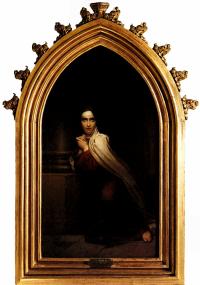

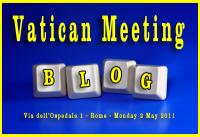
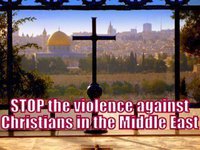

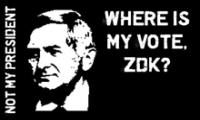
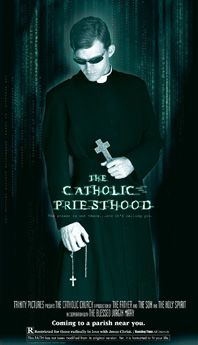






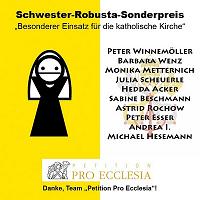





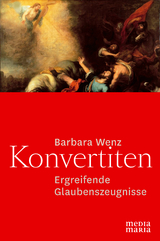
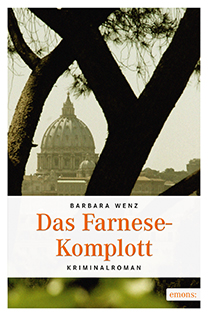




so what ???
Was soll problematisch sein?
1. Sicher falsch ist die alte, abgedroschene Aussage: "Vatican Council II, let's not forget, was not a dogmatic Council, but pastoral"
Ich kenne keine dogmatischen oder pastoralen Konzilien sondern nur Ökumenische und regionale Konzilien.
Damit wird der Satz "I do not deny with this the supreme authority of the Council" doch irgendwie fragwürdig, wenn man extra für Vaticanum II (oder gibt es noch andere "pastorale Konzilien"?) eine Kategorie erfindet, die sich durch weniger Verbindlichkeit auszeichnet.
Das erinnert mich ein wenig an die Ausflüchte von Protestanten, wenn sie auf die Aussagen Christi und seines Bruders Jakobus in Sachen Rechtfertigung angesprochen werden, es sei nunmal Paulus allein für das Thema zuständig, nicht der Sohn des lebendigen Gottes. Der ist nämlich in sowas nicht kompetent!
2. Interpretationsbedürftig ist folgender Satz:
"It is devoid of logical sense, let alone theological, to wish to contrast, as some do, Tradition and the "living" magisterium, as if Tradition were the past and the living magisterium were the present. Tradition is the magisterium present, past, and, we could say, future."
Nun, zuerst ist der empirische Befund, daß es einmal die Glaubenstradition gibt, die mit den Aposteln beginnt (wenn mir mal hier beginnen wollen). Die Schrift ist ihr ältestes Zeugnis und Lehramtsentscheidungen gingen in sie ein und formten sie. Und dann haben wir die Entscheidungen des heutigen Lehramts (die man gut aus dem Katechismus ablesen kann, der aber selbst nur eine redaktionelle Wiedergabe dessen ist).
Rein menschlich gesehen wäre hier ein Widerspruch, ein Bruch möglich. Aber geistlich, aufgrund des spezifisch katholischen Verständnis der Kirche, des Lehramts und des Versprechens Christi an die Kirche aus Mt 16, gehört es zum katholischen Glauben, daß dieser Glaube der gleiche ist damals heute und in Ewigkeit.
Wo liegt nun das Problem. Der Autor schreibt zwar gut katholisch
"It is devoid of logical sense, let alone theological, to wish to contrast, as some do, Tradition and the "living" magisterium"
Aber wenn er dann fortsetzt
"as if Tradition were the past and the living magisterium were the present. Tradition is the magisterium present, past, and, we could say, future."
Insbesondere in letzterem Satz löst er etwaige Spannungen einfach dadurch auf, daß die Tradition das heutige Lehramt bestimmt.
Klar soll das Lehramt auf die Tradition aufbauen, aber dann muß auch umgekehrt gelten, daß ich die Tradition mir durch das heutige Lehramt (und zwar nicht nur das unfehlbare) ausgelegt wird.
Gibt es einen Bruch, hat keine der beiden Parteien recht, denn der Glaube würde sich selbst widersprechen. Zuflucht bliebe nur in einer Ekklesiologie, wie sie die östlich-orthodoxen haben.
Nun, fairerweise muß ich sagen, daß ich den Autor bei Punkt 2 möglicherweise mißverstehe. Dies aber, weil die Aussage mißverständlich formuliert oder zumindest einseitig akzentuiert ist. Und im Gegensatz zu den Verächtern von Nostra Aetate, macht dies allein die Aussage nicht unwahr.
@str
>>I have been criticized for overlooking the documents of the Council or for interpreting them in a vein of discontinuity with the Tradition of the Church. Neither the first nor the second statement is true. The interpretation of the documents of the Council is not up to me, nor to any aspiring interpreter of the Council, but it is up to the magisterium of the Church, and to the magisterium I adhere. What I present are the facts, what I reconstruct is the historical context in which those documents came to light.<<
Dass dies nun aus einer ganz anderen Warte geschieht, als Pesch das versucht hat (den ich nicht gelesen habe), ist ja nun noch keine Bruchhermeneutik, die meiner Auffassung nach sowieso nur in Bezug auf die Dokumente selbst bzw. deren Rezeption, und nicht deren Gestehungsgeschichte geschehen kann - und wenn ich den Hl. Vater da richtig verstanden habe - sondern ein normaler Vorgang in der Geschichtswissenschaft. Wir kennen dazu ja die einschlägigen und überaus heftigen Historikerstreite auf anderen Gebieten.
Vielleicht lege ich jetzt den Begriff Hermeneutik aber auch zu streng literaturwissenschaftlich und auf die konkreten Texte bezogen aus.